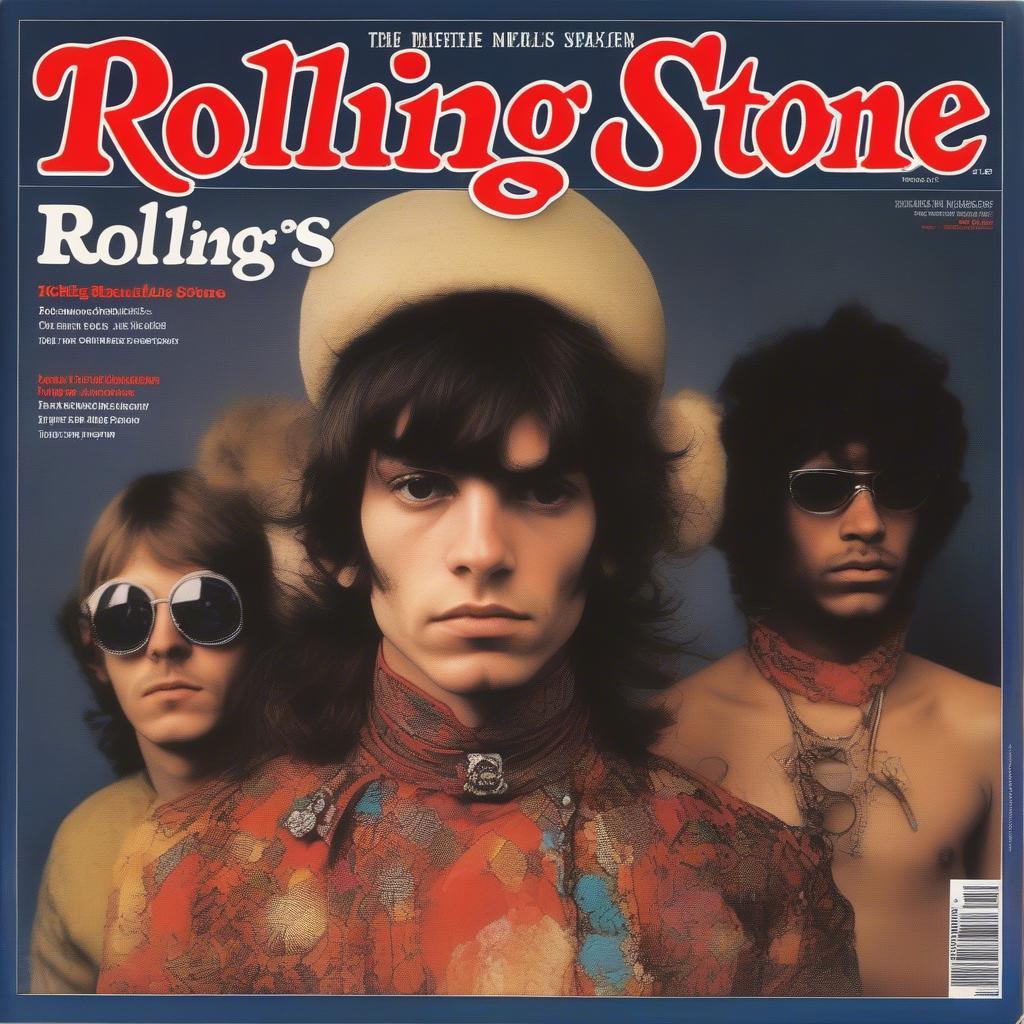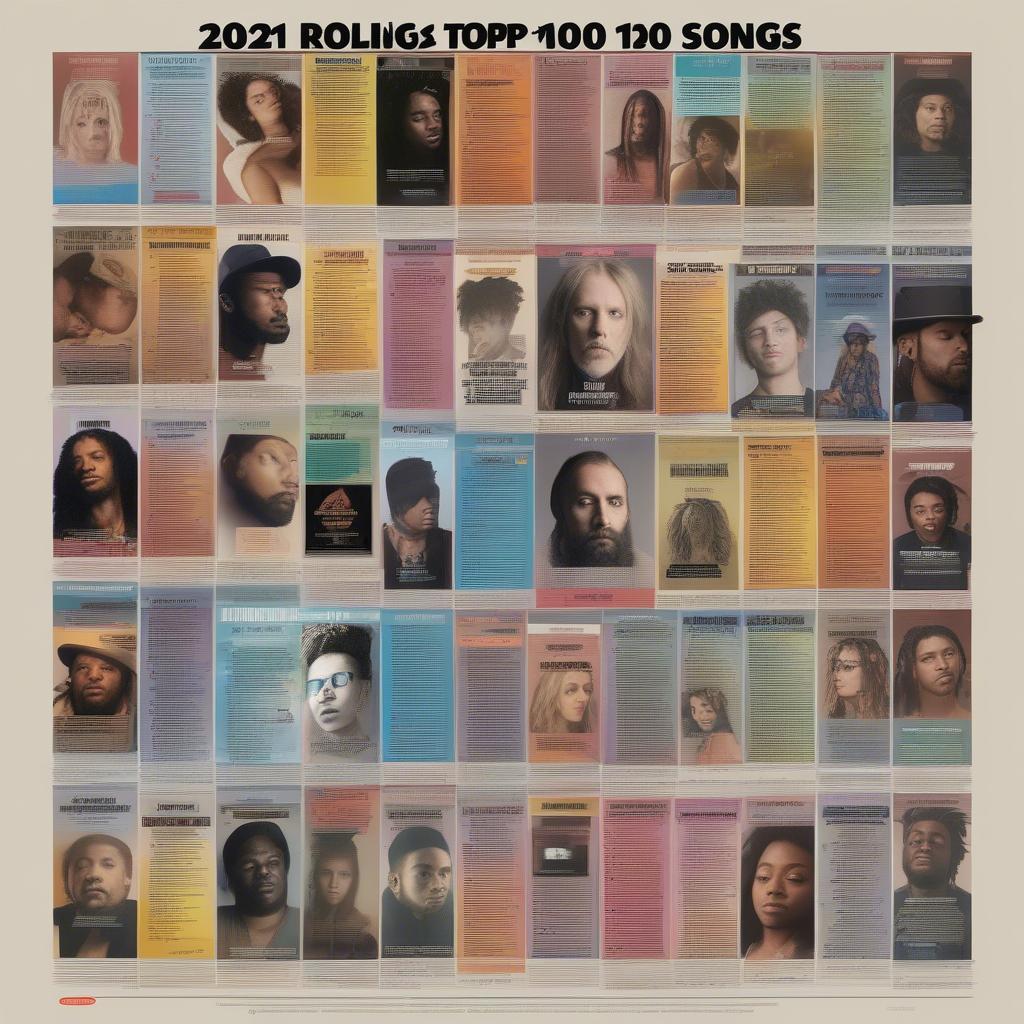The Rolling Stone Top 100 Songs list has been a staple for music lovers for decades. It represents a curated journey through influential tracks that have shaped popular culture. This article explores the significance of this list, the impact of the chosen songs, and the evolving landscape of music taste.
Delving into the Rolling Stone 100
The Rolling Stone 100, first published in 1967, isn’t just a list; it’s a cultural document. It reflects the magazine’s perspective on the most impactful songs up to that point, heavily weighted towards rock and roll. It sparked debate then, and continues to do so today. The list’s influence is undeniable, introducing listeners to classics and shaping their understanding of music history. The original list was compiled by critics and writers, relying heavily on their expert opinions.
 Rolling Stone Magazine Cover 1967
Rolling Stone Magazine Cover 1967
Evolution of the Rolling Stone Top 100 Songs
Over the years, Rolling Stone has revisited and revised its top 100 songs list. The most recent update, in 2021, reflected a broader range of genres and artists, acknowledging the evolving musical landscape. This shift towards inclusivity recognizes the impact of hip-hop, R&B, and other genres that weren’t as prominently featured in the original list. The inclusion of artists like Aretha Franklin and Public Enemy marks a significant step towards a more representative canon. billboard top 10 songs this week often showcase current trends.
Why is the List Important?
The Rolling Stone top 100 songs list acts as a guide for music discovery. It provides a starting point for those looking to explore influential music from different eras. The list also serves as a cultural touchstone, sparking conversations and debates about musical taste and the lasting impact of certain songs.
 Music Fans Discussing the Rolling Stone List
Music Fans Discussing the Rolling Stone List
Criticisms and Controversies Surrounding the List
No “best of” list is without its detractors. The Rolling Stone top 100 songs has been criticized for various reasons, including perceived biases towards certain genres and artists. Some argue that the list overlooks significant contributions from underrepresented artists and genres. The ongoing debate, however, highlights the importance of these conversations in shaping our understanding of music history. For fans of specific artists like johnny cash top 100 songs, the broader list might not always resonate.
What Were Some Notable Changes in the 2021 Update?
The 2021 update saw significant changes, reflecting the changing tides in music consumption and cultural influence. The inclusion of more hip-hop and R&B tracks, along with a greater representation of female artists, marked a shift towards a more inclusive and contemporary perspective. This update acknowledges the impact of these genres and artists on the broader musical landscape. Lists like the 2017 top 50 hip hop songs contribute to a deeper appreciation of genre-specific influence.
 Rolling Stone Top 100 Songs 2021 Update
Rolling Stone Top 100 Songs 2021 Update
“The 2021 update to the Rolling Stone 100 was a necessary evolution, reflecting the dynamic nature of music,” says Dr. Melody Harmony, a music historian and cultural critic. “It acknowledges the impact of diverse voices and genres, offering a more complete picture of music’s influence on society.”
“The list serves as a starting point for musical exploration,” adds Harmony. “It encourages listeners to delve into the rich tapestry of music history and discover the power of song.” Classic lists like billboard top songs 1973 offer insights into specific periods. For fans of disco, a list like the 1977 donna summer top 40 song might be more relevant.
In conclusion, the Rolling Stone top 100 songs list remains a vital document of musical influence and cultural impact. While it continues to generate debate and discussion, its role in shaping our understanding of music history is undeniable. The list encourages us to explore, discover, and engage with the power of music.
FAQ:
- When was the first Rolling Stone top 100 songs list published? (1967)
- When was the most recent update? (2021)
- Why is the list controversial? (Genre and artist bias)
- What were some key changes in the 2021 update? (Increased diversity and inclusion)
- How does the list impact music discovery? (Provides a starting point for exploration)
- Who compiles the list? (Rolling Stone writers and critics)
- Why is the list considered important? (Cultural touchstone and guide for music discovery)
Need help? Contact us at [email protected] or visit us at Constellation Blvd, Suite 100, Los Angeles, CA 90067, USA. Our customer service team is available 24/7.
